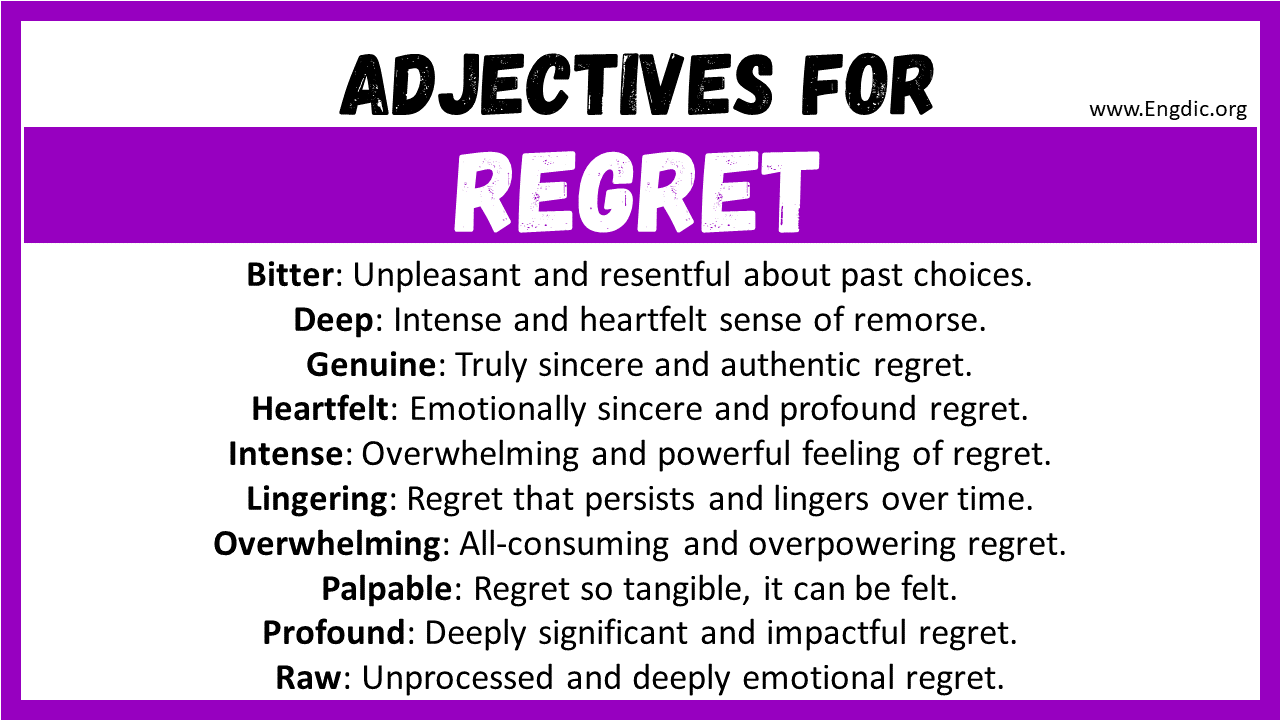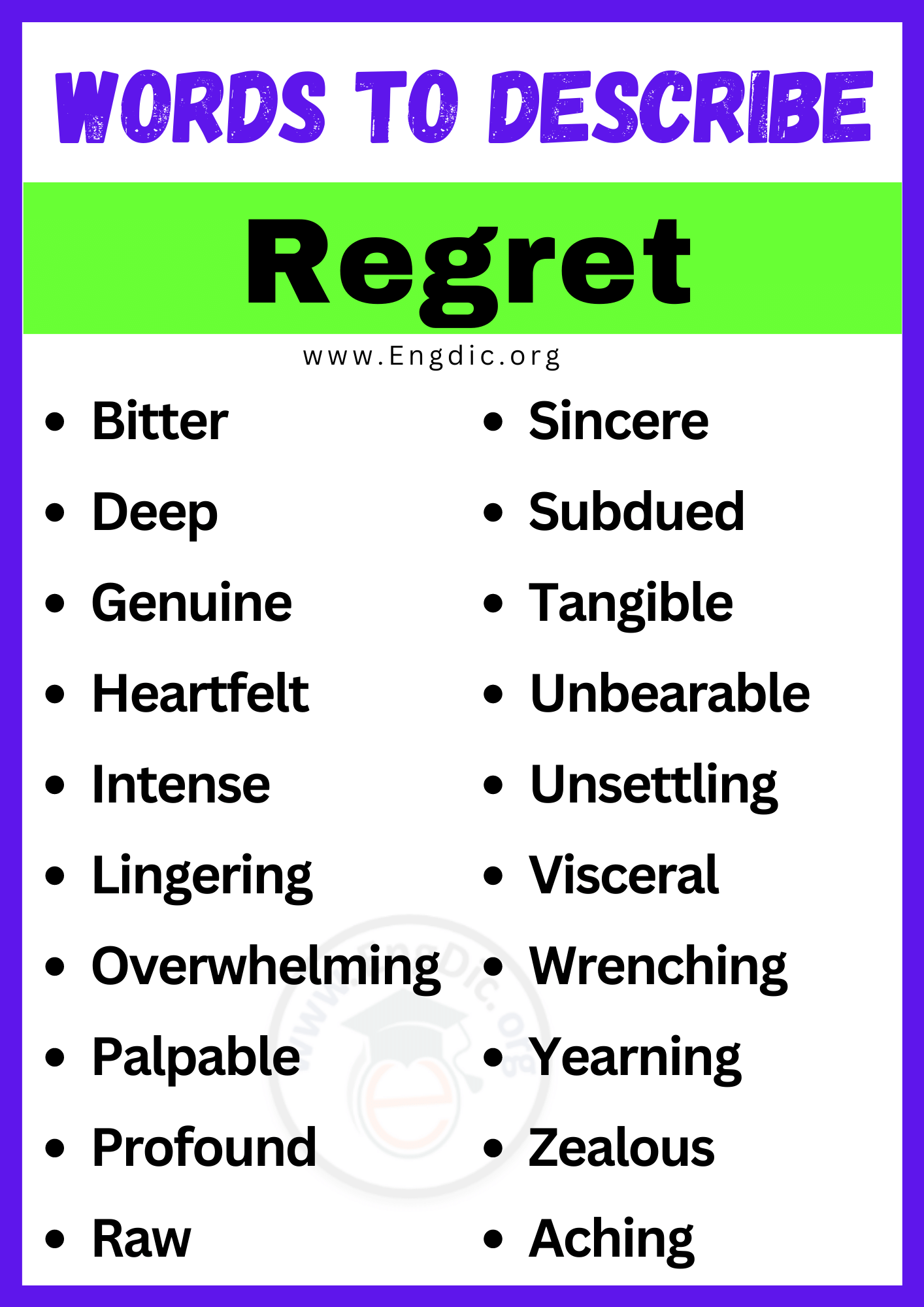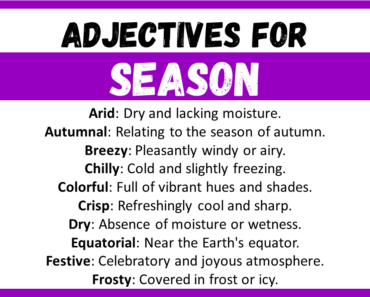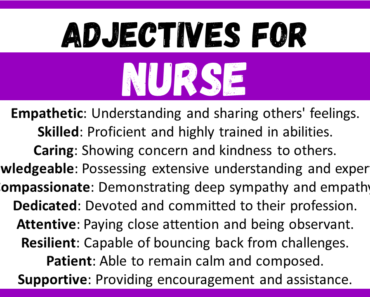Regret, a universal human experience, is the emotion we feel when we wish we had done things differently in the past. It is that poignant feeling of sorrow or disappointment that arises from recognizing the consequences of our choices or actions. While regret is often seen as a negative emotion, it serves as a powerful learning tool, prompting us to grow and evolve. In this blog post, we explore a diverse array of words that describe regret, capturing the complex and multifaceted nature of this profound emotion.
Adjectives for Regret
Here are the 20 Most Popular adjectives for regret:
- Bitter
- Deep
- Genuine
- Heartfelt
- Intense
- Lingering
- Overwhelming
- Palpable
- Profound
- Raw
- Sincere
- Subdued
- Tangible
- Unbearable
- Unsettling
- Visceral
- Wrenching
- Yearning
- Zealous
- Aching
Words to Describe Regret with Meanings
- Bitter: Unpleasant and resentful about past choices.
- Deep: Intense and heartfelt sense of remorse.
- Genuine: Truly sincere and authentic regret.
- Heartfelt: Emotionally sincere and profound regret.
- Intense: Overwhelming and powerful feeling of regret.
- Lingering: Regret that persists and lingers over time.
- Overwhelming: All-consuming and overpowering regret.
- Palpable: Regret so tangible, it can be felt.
- Profound: Deeply significant and impactful regret.
- Raw: Unprocessed and deeply emotional regret.
- Sincere: Honest and genuine expression of regret.
- Subdued: Quiet and restrained sense of regret.
- Tangible: Regret that is concrete and evident.
- Unbearable: Intolerable and agonizing sense of regret.
- Unsettling: Disturbing and disquieting feelings of regret.
- Visceral: Gut-wrenching and instinctive regret.
- Wrenching: Emotionally distressing and tormenting regret.
- Yearning: Regret accompanied by a longing desire.
- Zealous: Fervent and passionate regret.
- Aching: Regret that feels like a persistent ache.
Example Sentences for Regret Adjectives
- The bitter regret lingered after the breakup.
- She expressed deep regret for her actions.
- His apology seemed genuine and sincere.
- The letter conveyed heartfelt regret and sorrow.
- He felt intense regret for missing the opportunity.
- The lingering regret affected her decision-making.
- The consequences were overwhelming with regret.
- The palpable regret filled the room after the mistake.
- His words revealed profound regret for his choices.
- She couldn’t hide her raw regret in her eyes.
- The sincere apology was accepted by everyone.
- His face showed subdued regret for his actions.
- The tangible regret was evident in his voice.
- The unbearable regret made her break down in tears.
- The news brought an unsettling sense of regret.
- The visceral regret overwhelmed him after the accident.
- The wrenching regret kept him awake at night.
- His yearning regret led him to seek forgiveness.
- Her zealous regret drove her to change her ways.
- She carried an aching regret in her heart.
Explore More Words:
FAQ’s
How to describe regret in writing?
Describing regret in writing involves using emotive adjectives like “deep,” “heartfelt,” or “profound” to evoke the intensity of the emotion.
What is a word for feeling regretful?
A word for feeling regretful is “remorseful.” It signifies a strong sense of regret and guilt over past actions.
What is the adverb for regret?
The adverb for regret is “regretfully.” It is used to express actions or statements made with a sense of remorse or sorrow.








